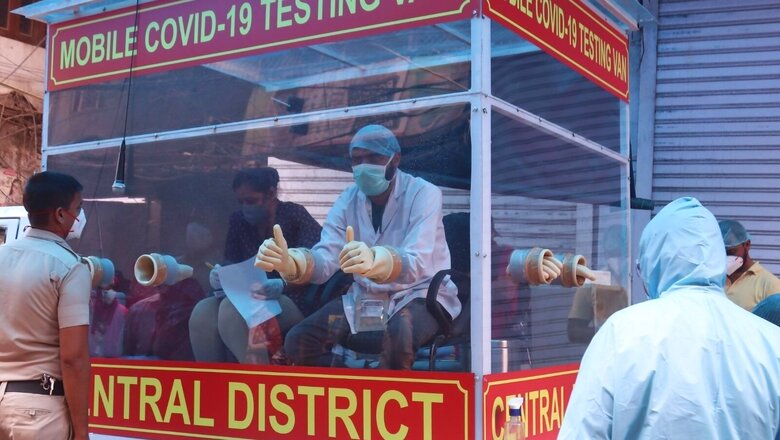
views
The results of the sixth sero survey in Delhi are out, revealing that more than 90 per cent of those covered in the national capital have developed antibodies against coronavirus. This means that Delhi is unlikely to witness a Covid-19 wave as destructive as the second wave in April and May until a new severe variant emerges, a government official said. The sample collection under the sixth sero-survey started on September 24. A total of 28,000 samples were collected from all the 280 wards, including New Delhi Municipal Council and Cantonment Board wards, in the capital. The seropositivity rate in every district is more than 85 per cent. More women were found seropositive as compared to men, sources said. The fifth round of sero survey conducted in January had shown that 56.13 per cent of the people in Delhi had developed antibodies against COVID-19. In April and May, Delhi battled a brutal second wave of the pandemic that claimed a massive number of lives with oxygen shortage and reduced supplies of essential medicines at hospitals adding to the woes.
News18 breaks down what the survey means, the situation in other states and the way forward:
First, what is sero survey?
Sero studies, popularly known as sero survey, examine how many people in a population have been infected with Covid-19 and recovered from the same. Sero-surveys use tests that examine the liquid part of blood, or ‘serum’, not nose, throat and mouth fluid. And these tests detect an immune response to the virus material, not SARS-CoV-2 virus material itself.
When a virus infection strikes, the body comes up with many immune responses. One of these is making proteins called antibodies that stick (or ‘bind’) to the virus – these show up within a few days after infection. While the infection disappears after a couple of weeks, the anti-virus antibodies, especially the IgG kind, stay around in the blood for a fairly long time. These antibodies are made whether the infected person was asymptomatic or had any actual illness.
So, if we test the blood for these antibodies at any point and find them (making the person ‘sero-positive’), we can say that this person had indeed been infected in the recent weeks/months.
What can sero-surveys not do?
The sero-survey test does not detect ‘protective’ antibodies, just all antibodies (the ‘protective’ ones are much harder to test for on a large scale).
What did the previous sero-survey in Delhi reveal?
The fifth sero-survey in January found that every second person in Delhi has developed antibodies against the novel coronavirus. This means of the over two crore people residing in Delhi, nearly one crore people have already contracted Covid-19 and recovered from it.
This pointed towards herd immunity, which experts say is said to have been developed in a population segment if 50-60 per cent of those are found to have the presence of antibodies in a seroprevalence survey.
Herd immunity implies that in any set of people in a community, after becoming affected by the virus, a lot many of them become immune to it, on account of antibodies developed in response to it. And, hence, such people become a protective layer between the infected person and unaffected people, thereby breaking the chain of viral transmission.
However, for the sixth sero-survey, a senior official said one cannot say Delhi has achieved herd immunity despite such a high level of sero-prevalence. We cannot say exactly if Delhi has achieved herd immunity because there are no studies or data to show that the virus won’t spread after a certain percentage of population is affected,” the official said.
What about other states?
Maharashtra: Post Diwali, the BMC is likely to conduct the sixth sero-survey after the latest one in August found antibodies against coronavirus among 86% of those surveyed. The fifth serosurvey conducted by the Brihanmumbai Municipal Corporation (BMC) in Mumbai in August 2021 shows that 86.64 percent of the 8,674 people surveyed have antibodies against Covid-19. This is significantly higher than the third sero-surveillance conducted in March this year, which found 36.3 percent of those surveyed had antibodies against Covid-19.
Kerala: More than 80 per cent of those aged 18 and above in Kerala have Covid-19 antibodies according to the latest seroprevalence study carried out by the LDF government, state health minister Veena George said. The survey, which concluded at the end of September, also found that sero prevalence was comparatively low — 65.4 per cent — in pregnant women between the ages of 18 and 49 years, she said. This was due to the precautions that women take during pregnancy, which kept them safe from infection, and delay in vaccination, the minister said.
Tamil Nadu: Tamil Nadu has witnessed an increase in the overall sero-prevalence among the people at 70 per cent, suggest the findings of a latest round of serosurvey by the state government. “The overall sero prevalence was 70 per cent and the highest sero positivity was observed in Virudhunagar at 84 per cent,” the report said.
Haryana: Antibodies against the COVID-19 infection were found in 76.3 per cent of people in the third round of sero-survey in Haryana, Health Minister Anil Vij said. He also released a report of the third survey, which was conducted in September, and that found the sero-positivity rate to be 78.1 per cent in urban areas and 75.1 per cent in rural areas.
Read all the Latest News , Breaking News and IPL 2022 Live Updates here.















Comments
0 comment